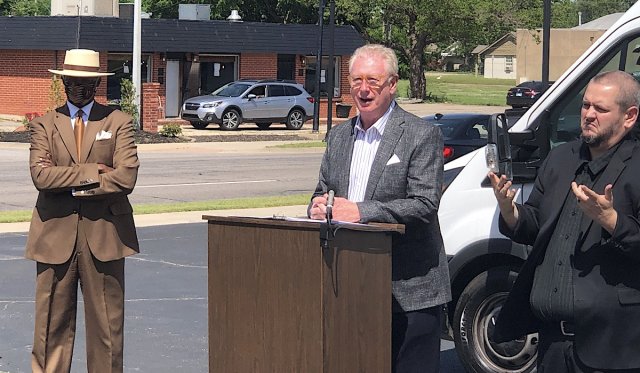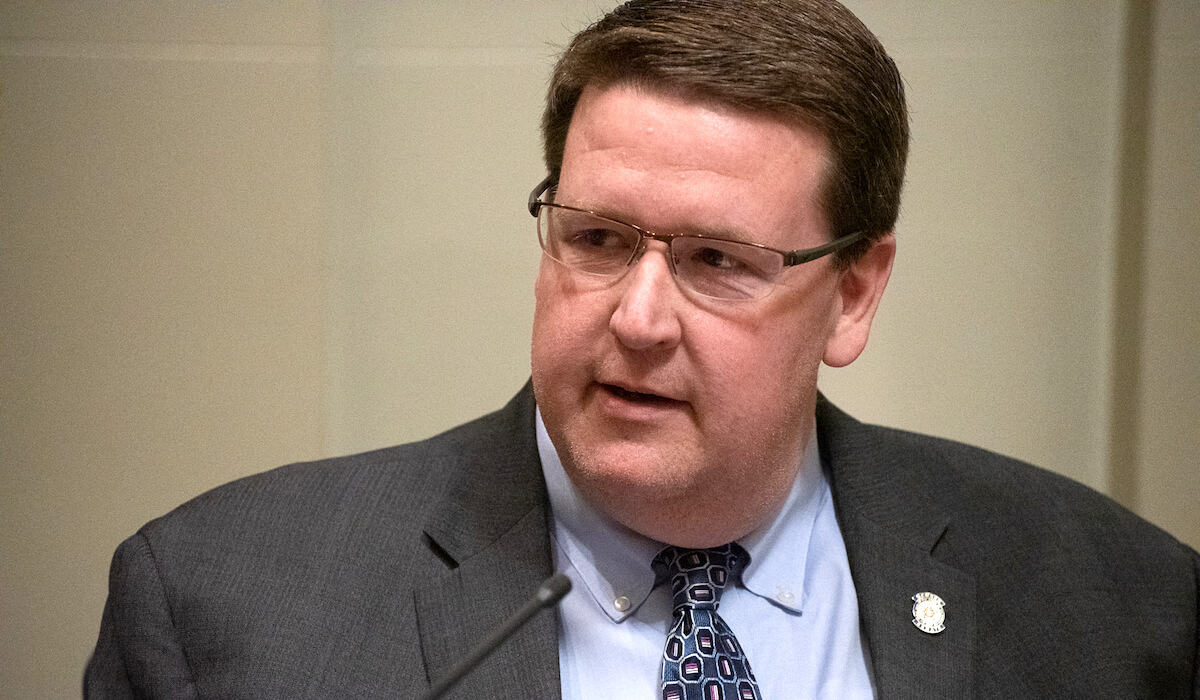

Gary Cox has been serving as commissioner of the Oklahoma State Department of Health since Gov. Kevin Stitt nominated him in September, but Senate Health and Human Services Committee Chairman Greg McCortney says “a whole lot of bad circumstances” will prevent Cox from being confirmed for the position by the State Senate.
“The Health and Human Services Committee is just not going to confirm that nomination, and the easiest way to do that is just not to schedule that hearing,” said McCortney (R-Ada) this afternoon. “I think different members of the committee had different concerns. I think that was, in the end, the problem.”
One primary issue overhanging Cox’s nomination was his lack of an advanced degree in the field of public health. An attorney with more than 40 years of public health experience, Cox served as the director of the Tulsa Health Department and, most recently, the Oklahoma City-County Health Department. He took over for Tom Bates, whom Stitt assigned a new task aimed at making Oklahoma’s social services more accessible.
Stitt nominated Cox for the post in September, roughly six months before the COVID-19 pandemic hit home in Oklahoma. Through a spokesperson, Cox sent NonDoc a statement about the Senate’s decision not to confirm him.
“I’m focused on continuing to flatten the curve and protect our state’s citizens,” Cox said. “This is up to the executive and legislative branches, my job is to save lives.”
State audit and state law complicate nomination
Even before the novel coronavirus spread across Oklahoma, Cox had faced criticism from within the long-beleaguered State Department of Health, and his tenure became more tumultuous when Attorney General Mike Hunter asked State Auditor and Inspector Cindy Byrd to audit the agency.
Those factors and potentially others left Cox’s confirmation untenable in the Senate committee, said Sen. Adam Pugh (R-Edmond), who was carrying the nomination.
“As always, I will fight for the constituents in my district, and I didn’t have the votes. I defer to the chair at that point,” Pugh said. “Probably if Gary Cox was being nominated in 2019 or 2021, it’s probably a different set of circumstances. Unfortunately for him, it’s just a perfect storm of challenges due to the pandemic (and) due to the fact you were trying to simultaneously change the requirements for the position. I think all of those things (played a role).”
McCortney agreed and offered additional perspective.
“I think it’s fair to say there are members of the committee who had conversations with employees at the Department of Health that caused them concern,” he said.
Cox’s name does not appear on the committee’s agenda for its 3:30 p.m. Monday, May 11, meeting. McCortney said he expects that to be the final Senate Health and Human Services Committee meeting of the 2020 legislative session, which must adjourn sine die by Friday, May 29.
“My understanding of the way this works is upon sine die, the nomination is considered rejected if it has not been accepted,” McCortney said. “So upon sine die, that nomination will have been considered to be rejected by the Senate.”
McCortney said he informed Gov. Kevin Stitt of the decision on the morning of May 7.
“In the end, it was my decision as the committee chair. I talked to many members of the committee for sure and have a pretty decent feel for how they feel about all of the different issues,” McCortney said. “I did consult with [President Pro Tem Greg Treat] before making that final decision. But that was much more me letting him know where I was and where I felt the committee was than me asking permission.”
McCortney said he had “very honest conversations” with Cox and others about the situation.
“There were a whole lot of bad circumstances piled into one big pile,” McCortney said.
Stitt released a statement shortly after the publication of this story.
“As a respected and dedicated public health professional who has brought over 40 years of experience to the State Department of Health, Gary Cox is more than qualified to serve as Oklahoma’s Commissioner of Health,” Stitt said. “Over the past seven months, Commissioner Cox has strengthened the State’s partnerships with key health entities, improved the transparency and efficiency of OSDH operations, and built a strong team that has proactively responded to the worst pandemic in a century. He is the right leader to transform the agency while also successfully confronting a historic health crisis and protecting the lives of Oklahomans, and I am thankful for his strong vision and continued guidance during these unprecedented times.”

Some senators surprised
Other members of the Senate Health and Human Services Committee offered their reactions Friday afternoon.
“I am disappointed. I had an opportunity to be on a long phone conversation with him and a couple of other senators, and I thought his long career in public health was just what we needed,” said Julie Daniels (R-Bartlesville). “Because of all the past difficulties with the Department of Health, I believe his administrative experience would have been a real benefit to that department, and it’s unfortunate that his taking the job coincided with this COVID-19 pandemic.”
Daniels said she knew the statutory requirement of an advanced health degree might pose a problem. So did Sen. Bill Coleman (R-Ponca City).
“Well, we never were able to get that authority changed. The bill was in the process,” Coleman said. “Had [Cox’s confirmation vote] come up, I’m not sure what I would have done. But that would have weighed heavily — wondering if it would have been legal to nominate him. I had very deep concerns on that. I did not have any deep concerns over him personally.”
Neither did Sen. George Young (D-OKC) who said he was with Cox earlier today at a mobile testing location.
“He was talking to me about that. I thought they had the votes,” Young said. “I didn’t have anything against him. My problem was that I thought it was ill-advised to strip that job description of academic requirements.”
Young said he was “kind of in the air” because of his personal relationship with the longtime county health department administrator who often preached the value of data.
“I thought he did a good job over at the Oklahoma City-County Health Department,” Young said.
Pugh said he thinks the issue of changing the law to make Cox qualified was most problematic.
“I think the requirements probably do have to change, but I think — whether perceived or reality — the idea of lowering the requirements when we are in a certified health emergency gave pause for some of the members of the committee,” Pugh said. “To my colleagues’ credit they take their nomination process very seriously, and I applaud that.”
Pugh said every senator has his or her own decision to make on any executive nominee.
“I appreciate that we were very thorough and thoughtful because this is a big deal, and that’s highlighted by the health emergency situation we are in,” Pugh said. “I think Gary Cox is a qualified individual. I think he is a good man who has a track record of public service.”
McCortney agreed.
“I have a lot of respect for Commissioner Cox and the service he has given over his career in his various public health capacities,” McCortney said. “The governor nominated him without ever discussing with the Legislature the fact he was going to need the Legislature to change statutes to make him qualified for the job.”
McCortney said Cox’s nomination snowballed as the legislative session collided with the pandemic.
“We kind of started with an issue, and as time went on, there were more and more issues,” McCortney said. “Whether it was the announcement from the attorney general that the Department of Health is being investigated once again for financial issues — the bill to change the statutes probably wasn’t handled as well as it could have been coming from the governor’s office.”
Sen. Paul Rosino (R-OKC) serves as vice chairman of the Senate committee, but he declined to say how he would have voted on Cox’s confirmation.
“I think the guy is just a victim of the circumstance of the condition we are in in the state right now,” Rosino said. “The guy has been a great public servant. If anything, he really should be applauded for what he has done for the state of Oklahoma. This is kind of just a sad ending.”
As for how Cox’s tenure at the State Department of Health will end, McCortney said he does not know.
“There may be some questions on that, so I would rather not speculate on how that goes down,” he said.
Gary Cox letter to Gov. Kevin Stitt sent May 11
 Loading...
Loading...
(Update: This story was updated at 5:40 p.m. Friday, May 8, to include comment from Gov. Kevin Stitt. It was updated again at 10 a.m. Wednesday, May 13, to include the letter Gary Cox sent to Stitt.)




















